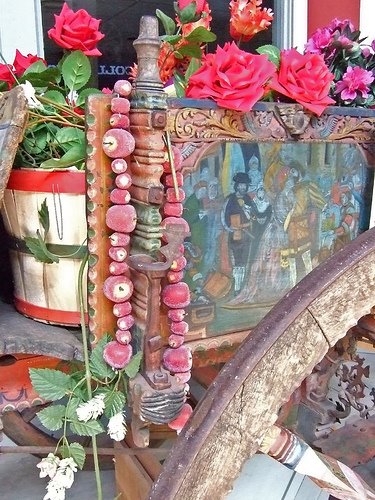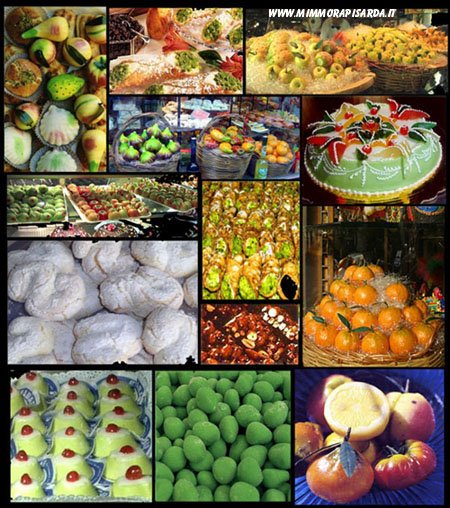
At-home trattorias are increasingly popular in Sicily. From the winding narrow street of the inner-Palermo suburb formerly know as Kalsa spreading throughout the historical centre, where you can wine and dine right in the middle of the street or in somebody's backyard. What counts is home-cooking.
Danielle Pergament from New York Times, guided by her Sicilian friend, discovers a brand new concept of dining.
IT was lunchtime in Palermo, and in the old quarter, a small trattoria was filling up with burly construction workers and fishermen in sodden boots — all crowded around rickety tables watching a soccer match on a staticky television set. The place was noisy with clanking glasses and men talking over one another. Platters of sautéed vegetables and grilled calamari lined the countertop, and the perfume of sizzling garlic drifted through the room. I scanned the other tables and ordered what everyone else was having: spaghetti, drizzled with olive oil and laden with fresh clams, mussels and tomatoes.
But when the pasta arrived, drenched in a briny, spicy tomato broth, there was no fork and no waiter in sight. There was just the owner, known simply as Pina, shuffling in threadbare slippers, a lighted cigarette precariously perched on the edge of her mouth. “You need a fork?” Pina barked. Her gravelly voice was so intimidating that I was ready to eat with my hands. “Get it yourself. Top drawer, next to the stove.”
If eating in Palermo's rustic trattorias seems like visiting someone's home, that's because it often is. Pina, a gruff Sicilian mother, keeps a bedroom behind the kitchen and five days a week opens her canteen-sized dining room for lunch, serving some of the most authentic food in this port city.
At Zia Pina (Via Argenteria, 67), four blocks from the Tyrrhenian Sea, you won't find a sign welcoming diners, written menus, a reservation book or even a telephone. Instead, there are half a dozen tables, biblical paintings and dented pots and pans gurgling and steaming on a beat-up stove.
But you can't simply walk in. If Pina doesn't like the look of you, she'll tell you the trattoria is closed — and she'll do it as she's serving platters of stuffed mushrooms and grilled swordfish to a table of hungry fishermen. Luckily, I arrived with my Sicilian friend Emanuele, a photojournalist who has been eating at places like Zia Pina since he was a child.
The food of Palermo, like its rocky shoreline and weathered faces, is a bit rough. Vegetables are crudely chopped; fish is served with head and tail; everything comes under a veil of coarse sea salt. Pina's cooking was no exception. She was partial to pasta tossed with fresh shrimp, calamari or sea bass, as well as hearty salads of potatoes, capers and onions. If you're still hungry, you're welcome to seconds, but don't expect Pina to bring them. You can help yourself from the caldron on the stove.
At-home trattorias are not the insular tradition they used to be in Sicily. What began decades ago as lunch counters for blue-collar workers, usually started by their wives at home, are spreading to garages and empty houses — and they are becoming increasingly popular with young Sicilians and businessmen, who come for the laid-back atmosphere, low prices and arguably the best food in Sicily.
The amateur chefs are cautiously opening their doors to the public, and their menus are expanding, too, though not by much. They are still open only for lunch (about 12:30 to 2 p.m.), prices are remarkably cheap (pasta is usually under 3 euros, about $4 at $1.38 to the euro), and the recipes were handed down from the chef's grandmother. A click more relaxed than standard trattorias, these places have the air of an old-fashioned speakeasy — the proprietor might sleep in the back room, and the entrance is purposely hard to find, with unmarked doors, few signs and no advertising.
And because the places are not entirely legal, the would-be restaurateurs don't have to worry about things like workplace insurance, smoking laws, liquor licenses or even taxes. “Most of these places pay protection money to the Mafia,” Emanuele said. “They just want to serve good food to their regulars and keep their heads down.”
Well, that and watch soccer. A few days later, Emanuele and I walked into La Rosa Nero, or the Pink Black — a small, free-standing concrete hut in the middle of the quiet, dusty Piazzetta della Api. On a Saturday afternoon last January, the scene inside was another story. Two small rooms, painted pink and black, were crammed with flimsy plastic tables and crowded with groups of men hunched over bowls of steaming pasta, plates of fried calamari and small cups of red wine. Their eyes were fixed on the television — Palermo versus Lazio, and Palermo was losing. Shouts and jeers filled the small trattoria. There wasn't an empty seat in the house.
Rosa Nero is run by a young man named Benedetto. He wouldn't reveal his last name because his trattoria is not licensed and he preferred not to call attention to himself. Benedetto explained that this used to be his mother's house. Friends would come over to watch soccer, and his mother would whip up bowls of spaghetti with sardines. Before he knew it, the dining room had grown into a neighborhood soccer club and, as more friends came, a trattoria was born.
Emanuele and I sat down next to a group of teenagers and ordered the house special: angiova, or pasta with sardines. It arrived like an untossed salad — whole sardines (heads on), chunks of tomato and a splatter of pine nuts and sweet raisins, all piled atop a small mountain of pasta. I grabbed the fork and spoon, and mixed it up until it turned into a hearty sauce — sweet, salty and a little nutty.
Full and happy, we got up to leave and I started to leave a tip. “This isn't done,” said Emanuele. “These places don't pay taxes; all the money goes in their pockets.” Do they ever get in trouble with the law? “See those two men in the corner?” he pointed. “They're police, and they like the food as much as the rest of us.”
On my last afternoon in Palermo, Emanuele and I walked down to the waterfront, to an area known as Piazza Kalsa. Our destination was Padre Aldo (again, no address, no phone). The trattoria could easily be mistaken for someone's home — a tidy house on a residential block with a little garden on one side and a paved driveway on the other. “I was born next door,” said Aldo Balestreri, a lively 77-year-old with a stubbly white beard. “My specialty is grilled fish.” He paused for dramatic effect. “And Camilla Parker Bowles ate here once.”
Mr. Balestreri added that this used to be a taverna — a hall where men drank grappa until sunrise. Then, one summer about 40 years ago, he rolled a barbecue grill onto the driveway and started cooking meat. Next thing he knew, he had a trattoria.
Mr. Balestreri added that this used to be a taverna — a hall where men drank grappa until sunrise. Then, one summer about 40 years ago, he rolled a barbecue grill onto the driveway and started cooking meat. Next thing he knew, he had a trattoria.
Despite the chilly weather, most patrons were sitting at plastic tables on the driveway, now a patio. We sat down and listened to the menu. Moments later, an antipasto of olives, sardines, tomatoes and capers, drizzled in olive oil and coarse grains of salt, arrived on a worn block of wood. For pasta, we had spaghetti with baby shrimp, mussels, rough-cut garlic and spicy red pepper flakes. We washed it down with chilled red wine and watched the lunch crowd ramble in — young suntanned couples, gray-haired men with callused hands, and teenage boys with greasy hair and baggy jeans.
Then Padre Aldo re-emerged, holding two swordfish steaks. He slapped them on the grill and started calling out the day's menu over the hiss of the barbecue. A few moments later, he brought us two plates of spada alla palermitana, or swordfish Palermo-style — lightly breaded with a few drops of olive oil and a fat lemon wedge.
The three courses and a bottle of wine came out to 20 euros. As we walked away, Aldo called out from the searing iron grill: “You never asked why they call me Padre Aldo. It's because they think I'm Jesus — my food is that good.”







I love your blog, I love your postings 'on a shoestring', with the falling US dollar, more and more I travel on a shoestring- for lodgings and for food and public transportation like trains and buses. Thanks
ReplyDeleteWell, expect a few more "on a shoestring" postings over the next few weeks as we have found some great places with incredible value. Stay tuned!
ReplyDelete